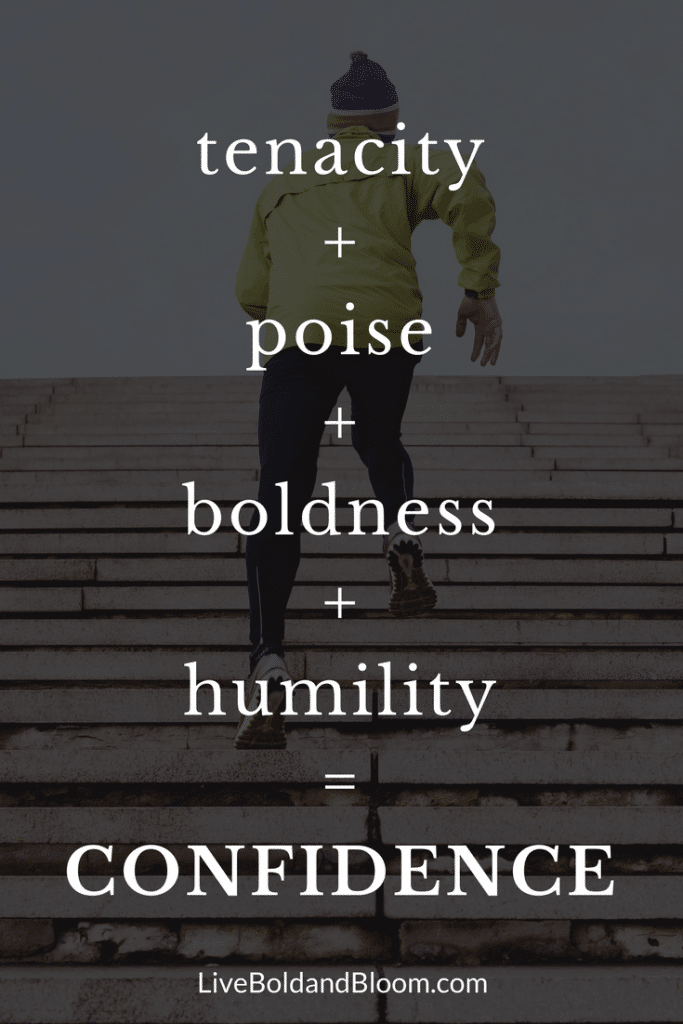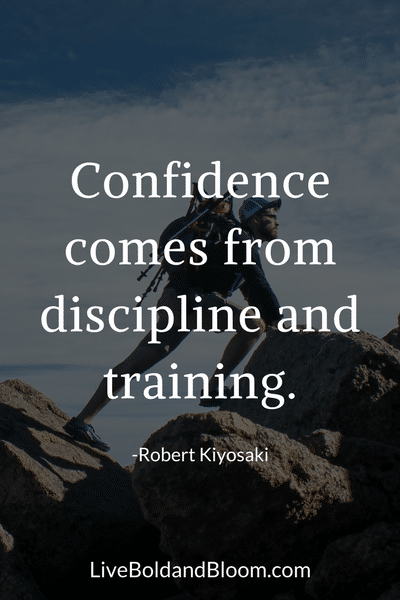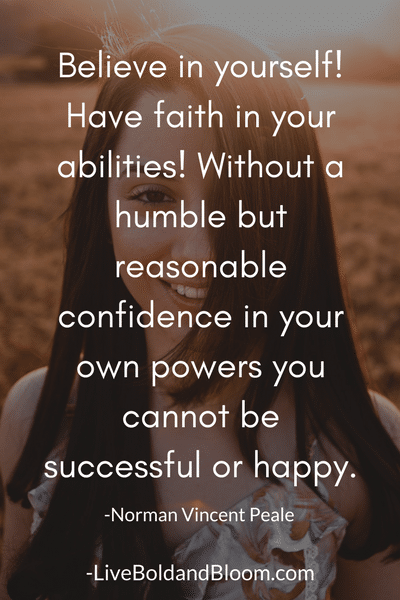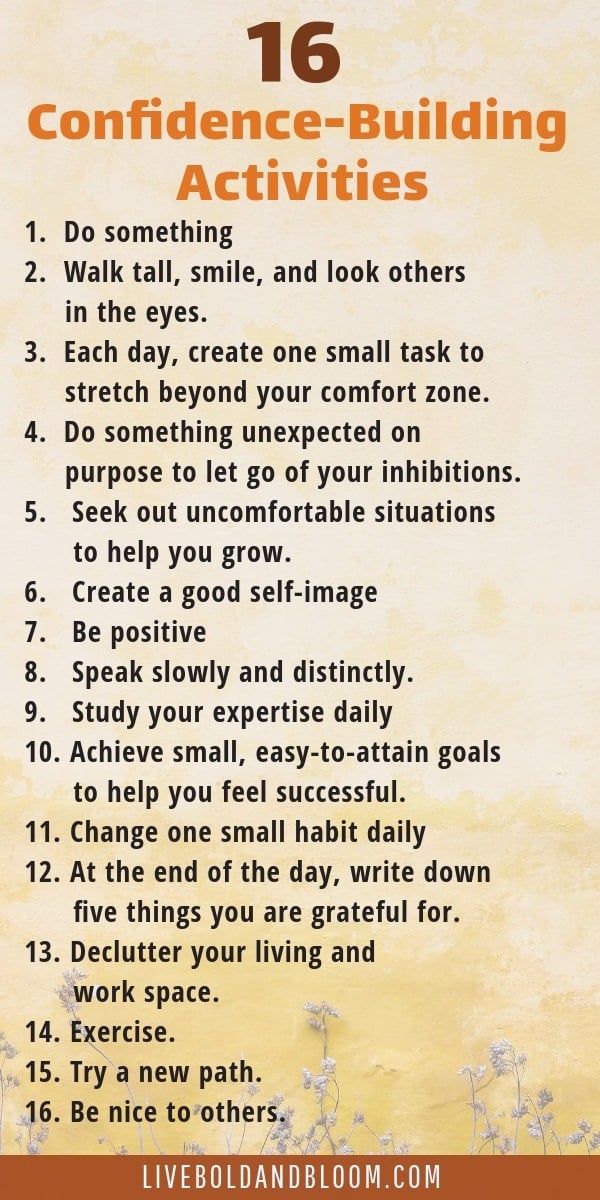Studies confirm that those with a strong level of confidence make more money, have better relationships, and enjoy more personal and professional success than those who don’t. Unfortunately, many people struggle with a lack of confidence from time to time. I had trouble with self-confidence in my younger years, and I didn’t exude the demeanor to make other people believe I was as competent as I was. After realizing that confidence is a skill that can be learned and practicing confidence-building activities, I was able to step out of my comfort zone and gain the self-assurance to be successful. Exuding confidence is so valuable that other people view it as a defining characteristic. Research confirms that people prefer confidence over expertise, and I can say from personal experience that this is true. With confidence, you can acknowledge where you need to improve and are motivated to gain the expertise needed. Your positive, self-possessed outlook is attractive and makes others feel confident about you and your abilities. But you can’t sit back and wait for confidence to come knocking at your door. You have to go after it and practice the skills that can change your outlook and beliefs about yourself. Are you ready to start building your own confidence? (Sidebar: Would you like to bump up your confidence and feel great in social settings? If so check out my online course sale that’s going on now!)
Attributes of Confident People
Confident people love to try new things because they are not scared of failure. This is part of having a growth mindset, which means you believe you can constantly grow and you measure that by your effort, not your results. Confident people are also able to make their own decisions without the undue influence of other people because they know what they want. They can be vulnerable and authentic — letting their guards down and living freely. So, what can you do to increase your confidence? Here are some activities that you can engage in to build your confidence and improve your life.
16 Confidence Building Activities
1. Do something—get out there—join a sports team, volunteer, engage on a regular basis.
The more practice you have getting out there and becoming engaged with your community, the more confidence you will have. This can help build positive peer relationships and give you the assurance that you are well-received by other people. If this feels intimidating, start with an activity in which you have some level of competence and skill.
2. Walk tall, smile, and look others in the eyes.
If you look like you’re confident, you are more likely to feel it. Having an aura of confidence is likely to attract positive attention from other people, and possibly open up new opportunities. If you don’t feel as confident as you would like to, use the “fake it ’til you make it” approach to giving yourself a boost. This will help build skills to appear confident when it really matters, such as during a job interview, public speaking, or at a social event. Work on improving your body language and your social interactions.
3. Each day, create one small task to stretch beyond your comfort zone.
The more you leave your comfort zone and come out the other side successful, the more you will realize all you can do. Take some time each day to stretch yourself so you can get comfortable with being uncomfortable. You may have a few failures, but that’s OK. Failing is part of learning and expanding yourself. There more you exert yourself the more confident you’ll be in everything you do, even if it is something you have never done before.
4. Do something unexpected on purpose to let go of your inhibitions.
Don’t let anything hold you back. Being hesitant can decrease your confidence level because it means you are second-guessing yourself. Again, this is a great way to prove to yourself that you have abilities that you have not yet uncovered. Trust yourself. Once you see what you are able to do, you will want to try to do more.
5. Seek out uncomfortable situations to help you grow.
A lot of people are so comfortable in their lives that they are actually miserable. Comfort can cause you to be self-absorbed, bored, and discontent. Psychologist Dr. Elizabeth Lombardo notes that people who look for new experiences on a regular basis are more creative and emotionally resilient overall than people who stay stuck in their routine. Embrace discomfort to help yourself grow.
6. Create a good self-image with a haircut, nice clothes, and accessories.
When you look good, you feel good. Improving your self-image is similar to improving any skill as it takes time and practice. But buffing up your appearance and style is an easy win that you can manage quickly. Having self-confidence involves cultivating a positive attitude about yourself and how you want to present yourself to the world. Learn to appreciate your own worthiness and develop self-respect by taking good care of yourself and your appearance. By starting on the inside and working your way out, you can build your self-confidence. This will also help remove any negative misperceptions from others that may be preventing you from the success you deserve.
7. Be positive. Say yes. Respond with good words.
There are a lot of ways you can change negative thoughts to more reasonable and positive thoughts. Focus on a few negative thoughts at a time to remind yourself how taking a positive approach can build your confidence. Here are some positive thought strategies that can help you improve your life:
Avoid exaggeration. Stop negative thoughts as soon as they come up. Focus on the positive. Accept your flaws and imperfections with grace. Replace criticism with encouraging thoughts and words. Don’t worry about things you cannot control. Take responsibility for your own feelings. Be kind to yourself. Focus more on what you’re good at, rather than what you’re not.
8. Speak slowly and distinctly.
Speaking slowly will help you communicate more effectively. It allows you to take the time to connect your emotions to what you are saying, helping you better get your point across. Speaking more slowly lets you focus on the discussion you’re having with someone. It gives you confidence in your responses as you take time to formulate and articulate them. Slowing down also helps you speak more eloquently with purpose and sound more intelligent and professional.
9. Study your expertise daily—read a journal, seek new information, write.
A great thing about life is that you never have to stop learning. There is always new information to learn and discover. You must continuously seek out new information to be successful and confident in your abilities. To live life to the fullest, look for ways you can improve every day. This shouldn’t stop at those endeavors you are already skilled at doing. Keep researching about your interests, career skills, or an entirely new life passion to learn more and expand your achievements.
10. Achieve small, easy-to-attain goals to help you feel successful.
In order to achieve a big goal, you have to start with smaller milestones. Early and quick successes will give you a sense of pride and motivation. Start with small habits that a part of bigger goals. Be sure they are relatively easy to accomplish so you can feel confident in your progress as you are working towards bigger things. This will help you feel successful because you will be able to start crossing things off of your list of things to do and feel like you are making progress.
11. Change one small habit daily—drink one glass of water when you wake.
Research has shown that rituals actually have the power to make you feel more confident. If you start incredibly small, you can grow your small habits into routine behaviors that you do without even thinking about it. For example, have you heard of the “One Push-up Challenge”? You start with doing one push-up a day. That’s it. Every day. Then, once that becomes a routine, you grow it to two push-ups. Slowly but surely, you will create a ritual of doing a full exercise routine every day. Try the One Push-Up Challenge or create a ritual of drinking one glass of water when you wake up in the morning. Just start small and see where it can take you.
12. At the end of the day, write down five things you are grateful for.
The benefits of practicing gratitude are huge. If you take the time to regularly practice gratitude and notice and reflect on the things that you are thankful for, you will experience more positive emotions, feel more confident, express more compassion, and even build your immune system. Remember, gratitude doesn’t need to be saved for momentous occasions. Take some time every night to reflect on the things you are grateful for. Research conducted by UC Davis psychologist, Robert Emmons, demonstrates that keeping a gratitude journal and writing small reflections on moments you’re thankful for can significantly increase your well-being, confidence, and overall life satisfaction.
13. Declutter your living and work space—get organized.
Thinking about cleaning can be daunting, but when it comes to being organized, there are a number of benefits that you can reap. You spend so much of your day in your office and in your living space that it can certainly have an impact on the way you feel. Being in a cluttered space can subconsciously communicate a pessimistic attitude and cause you agitation. If you are exposed to this on a daily basis, it infects your inner world. Also, initial impressions last. Consider what clients and visitors think of you and your mindset when they come into a clean and tidy office or living space versus one that is cluttered and messy.
14. Exercise—your body image is important.
Self-confidence has a lot to do with what you believe in and what you actively set out to achieve. For most of us, feeling confident includes feeling good about our bodies and physical health. Exercise is a critical tool that improves your overall confidence. When you feel good physically, you also feel mentally strong, capable, and successful. Sticking to an exercise habit gives you a boost of confidence, knowing that you have what it takes to commit to your goals. And of course, exercise can transform your body and help you lose weight, which can be a huge boost to your confidence. As with any other new habit or goal, start small with an exercise habit. Begin with just five minutes a day and slowly work your way up to your desired exercise time. This will help you stick to your plan without getting overwhelmed in the early stages.
15. Try a new path—go a different route.
Take the road less traveled in a variety of work or life endeavors. Change things up. Get out of your rut and do things differently. These minor change-ups can help you discover new things and get out of your normal routine. It is one effective but non-threatening way to step out of your comfort zone. While it can always be helpful to have a sense of routine and direction, sometimes moving forward without a concrete plan or expectations for what is coming next can be exciting and motivating.
16. Be nice to others—pay it forward, kindness matters.
There is nothing that is more rewarding than being kind and helping others, and confident people are able to easily spread kindness wherever they go. Kindness matters for many reasons. It can decrease your anxiety in social situations, make you feel good, and spark hope for the recipients of your kindness. Kindness is contagious, and paying it forward can have a domino effect. Look for opportunities during your day to say or do something kind for a friend or a complete stranger. Be sure you don’t neglect kindness when it comes to those closest to you — your spouse, children, and family members. Try to respond with kindness, even when someone is behaving badly or has said something unkind to you. Your kindness can be disarming and show others a better way. If you need a little boost to your confidence, remember that confidence is a skill you can practice and build on every day. Choose one or two of these actions to focus on, and keep a journal detailing how your feelings of confidence are increasing. Just seeing how your confidence is growing will further boost your confidence! Leave a note in the comments about your experiences trying some of the activities on this list, and share this article with friends who you think may benefit from these confidence tips.



